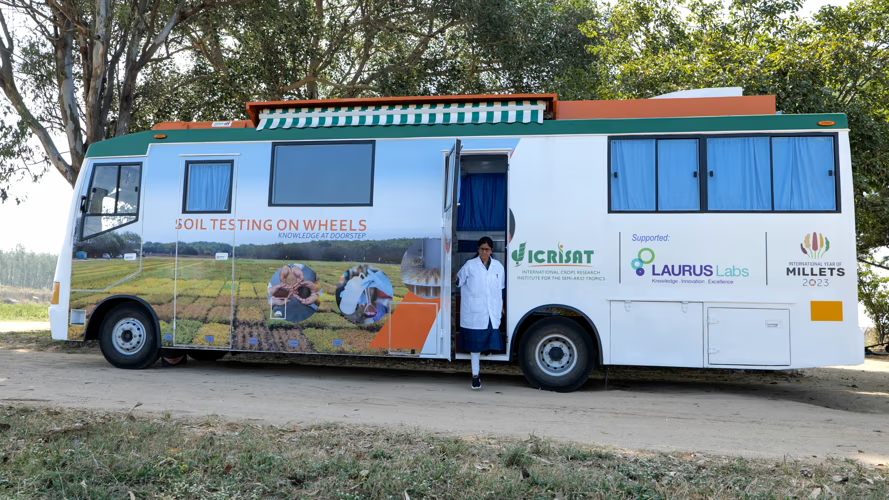Tuesday, 24 February 2026

What began with a child’s candid reply—“Food comes from the supermarket”—to a simple question about the origin of food has sparked a groundbreaking initiative in Telangana. The state’s first Mobile Soil Health Testing Bus, launched by the Laurus Charitable Trust (LCT) in collaboration with ICRISAT, is now driving awareness about soil health among farming communities and youth.
The mobile lab is providing science-backed soil testing services directly to farmers in 22 villages across Shamirpet and Muduchintalapalli mandals. Supported by district Agriculture Department officials, the initiative aims to educate and empower farmers with the knowledge needed to improve soil quality and boost agricultural productivity. “This state-of-the-art mobile lab is designed not just to test soil but to spark a movement,” said Dr Himanshu Pathak, Director General of ICRISAT. The mobile soil health lab, launched by Laurus Charitable Trust (LCT) in partnership with ICRISAT, is transforming farming communities in Telangana by providing valuable soil diagnostics and education. It offers farmers—many testing their soil for the first time in years—critical insights into the condition of their land, while also teaching schoolchildren about the importance of soil in food production.
Central to this initiative is the belief that healthy soil grows healthy plants, which in turn supports a healthy planet—an approach aligned with the One Health framework championed by ICRISAT and Laurus Labs, recognizing the interconnectedness of human, environmental, and ecosystem health.
“Soil is not just dirt—it’s alive. When we heal it, we heal everything connected to it,” Dr. Pathak explained. The program is helping farmers move away from indiscriminate fertilizer use toward integrated nutrient management that addresses organic carbon and micronutrient deficiencies, improving productivity and restoring soil vitality.
Ravi Kumar, Executive Director and CFO of Laurus Labs, highlighted the company’s commitment through CSR efforts focusing on health, education, and the environment. “Our partnership with ICRISAT on the ‘Agriculture on Wheels’ initiative is a significant step in promoting soil and water health. Soil is key to future generations; this effort will help farmers become more profitable. This is just the beginning—we look forward to doing much more together,” he said.
In villages where trust in agricultural inputs had eroded due to poor fertilizer practices and uncertain returns, the soil testing bus brought fresh hope—offering unbiased, science-based advice without any sales agenda. Between January 2023 and February 2025, ICRISAT scientists tested 2,400 soil samples and issued an equal number of Soil Health Cards, providing tailored guidance to each farmer.
Konda Anjaiah, a farmer from Kolthur village in Muduchintalapalli mandal, shared his experience: “A bus came to our village and informed us we would receive useful agricultural advice. They visited our Gram Panchayat Office and distributed soil health cards with instructions on how to grow vegetables and cereals without overusing fertilizers. Following their recommendations, our crops grew well.”
The mobile lab conducts comprehensive soil diagnostics, analyzing 13 key parameters, including often-overlooked micronutrients essential for dryland farming, such as iron, zinc, copper, boron, and manganese. Water quality testing is also provided based on farmers’ requests.
Shilpa Yadagiri, Sarpanch of Kolthur village, expressed gratitude for the initiative: “We are deeply thankful to LCT for encouraging farmers to test their soils and for organizing an exposure visit to ICRISAT, which remains a memorable experience.”
Beyond soil testing, the mobile lab actively engages local communities and schools. It has reached four local schools and one international school, involving over 1,500 students in interactive learning activities including quizzes and storytelling. Students celebrated World Soil Day 2024 by exploring the crucial role of soil, sparking curiosity and conversations beyond the classroom.
Additional elements of the program include farmer exposure visits to ICRISAT’s Patancheru campus, 22 training sessions on aerobic composting, distribution of compost starter kits to 110 farmers, plans to launch a Plant Health Diagnostic app, and village murals promoting soil health awareness.
Currently covering over 3,488 acres, the project is poised to expand to 615 acres across Keesara mandal, driven by growing community interest and government support.